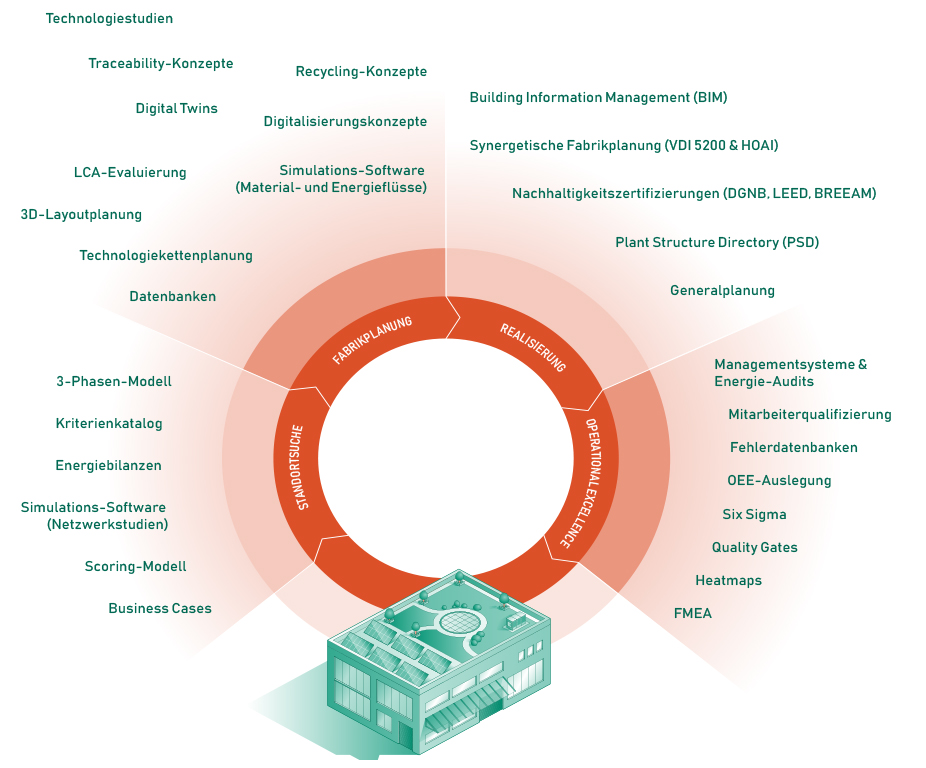Metroplan and Fraunhofer FFB develop framework for requirements-based factory planning in battery production
Münster/Hamburg. The exponentially growing demand for battery cells , which are a key technology for electromobility and the storage of renewable energy, can only be met if production is ramped up over the next few years. However, the construction of a gigafactory poses particular challenges for factory planning. In order to reduce risks and simplify commissioning, Metroplan and the Fraunhofer Research Institution for Battery Cell Production FFB have developed a framework for planning and implementing battery factories in line with requirements. To this end, the development process of a battery factory, from the search for a location to stable production operation, was divided into four main phases, for each of which the core challenges are identified and dedicated solution approaches are described. The aim is always to optimize the four main criteria of quality, costs, sustainability and flexibility. The key messages from this development process are now being published in a joint white paper. The publication, entitled "Requirements-based factory planning in the battery production environment", is rounded off with a current practical example in which some of the tools developed were applied and their effectiveness validated.
To this end, the development process of a battery factory, from the search for a location to stable production operations, was divided into four main phases, for each of which the core challenges are identified and dedicated solutions are described. The aim is always to optimize the four main criteria of quality, costs, sustainability, and adaptability. The publication entitled "Requirements-based factory planning in the battery production environment" is rounded off with a current practical example in which some of the tools developed were applied and their effectiveness validated.
Matthias Göke, Managing Partner at Metroplan, illustrates the importance of this: "The production of batteries involves very complex material and process requirements, which are reflected in a highly regulated production environment with clean and dry rooms and the separation of logistics and storage structures, among other things. Accordingly, many complex dependencies must be taken into account during planning. "
Compared to conventional factory planning projects, battery cell production poses additional challenges such as a lack of experience, complex supply chains, a limited selection of plant manufacturers, and strict regulatory requirements. The dynamic development of market requirements as well as product and production technologies also requires a great deal of expertise in the associated decision-making processes. Sustainability also plays a major role, as the material and energy requirements of production currently account for a large part of the ecological footprint of an individual battery cell;
"Against the backdrop of the energy transition and transformation to electromobility, enormous market growth is forecast for the battery industry on both the customer and supplier side," explains Professor Achim Kampker, one of the institute directors at Fraunhofer FFB. "Depending on the forecast, we can expect a tenfold increase in current production capacities by 2030. At the same time as this ambitious growth, there are numerous specialist challenges in the planning and realization of the associated production facilities."
Current studies assume a global annual battery demand of up to 5,500 gigawatt hours[1] in 2040 (for comparison 2021: 250 GWh). This would correspond to a market volume of around 500 to 600 billion euros in 2040 with further strong market growth in the following years. To meet this enormous demand for battery cells, new, large battery cell factories are currently being built in many locations in Europe, Asia, and North America.
In the white paper "Requirements-based factory planning in the battery production environment", Metroplan and Fraunhofer FFB have combined their expertise in factory planning with specialist knowledge in the field of battery cell production. This provides companies involved in battery production with an overview of the solutions and support options that the two partners offer for the holistic planning and realization of new battery factories. This provides construction companies and battery cell producers with an efficient and sustainable solution that is tailored to their respective needs.
[1] E.g. Solid-State Battery Roadmap 2035+ (fraunhofer.de) and ISI Environment Report (fraunhofer.de)
Last modified:




